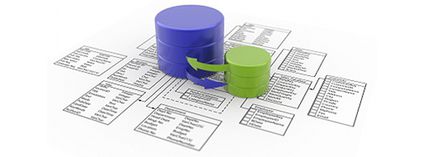Banking the data with checking its quality and that of the associated metadata (data describing the data)
Banking means storing the data/metadata in files and in databases. Depending on the type, quantity and volume of data and metadata, it may be stored using "simple" files or using databases.
Definition of a database
A database is an entity in which it is possible to store data in a structured manner and with the least possible redundancy. These data must be able to be used by programmes, by different users. Thus, the concept of the database is generally coupled with that of the network, in order to be able to share this information, hence the suffix base.
We generally speak of an information system to designate the entire structure grouping the resources put in place for sharing data.
The database can make data available to users for reading, writing or updating, while applying the permissions granted to the users. The use of databases facilitates the sharing of information, enables automatic checking of the coherence and redundancy of information, limits access to information, enables production of summaries from raw information, etc.
Utility of a database
A database can:
- index data
- identify duplicates
- manage metadata, which become extremely complicated and detailed
- ensure consistent file formats
- compile datasets
- format datasets, harmonising units, parameters, etc.
- divide data into different banks
- update common reference systems (taxonomy) and catalogues (collections of metadata)
- ensure coherence with international standards in force
Processing
To make certain data usable, processing is necessary.
- ADCP (Calculation of absolute velocity, filtering and averaging)
- Gravimetry (Reduction of values, association with reference stations)
- Magnetism (Difference between the ship's position and the magnetometer's position)

